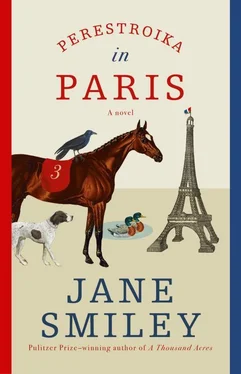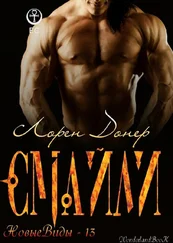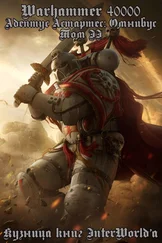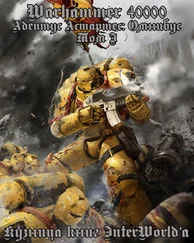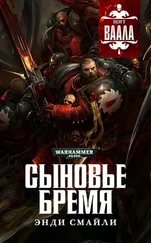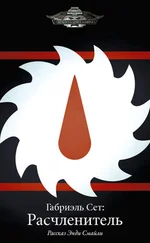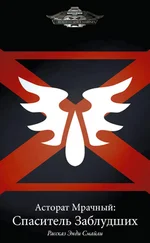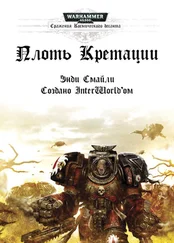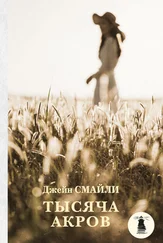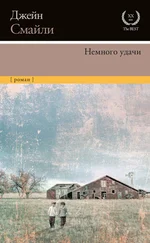The pond beside the great four-legged brilliant thing that Paras could not see to the top of was inside a low fence, but this time, the footing of the approach was fine. Paras backed off five strides or so and popped over it. The grass inside the fence was rich and deep, and the water in the pond was good enough. In Paras’s experience, everywhere you went, the taste of water was different. Here it was rich and dirty, but with a sweetness, too. She was thirsty, and drank her fill. Frida soon appeared, and she, too, jumped the fence. Her form was good, Paras thought, in spite of the weight of the purse between her jaws—knees tucked, a little kick of the hind legs to clear the top metal bits. Frida took a drink. And then the screaming began. Paras was startled, and snorted and reared, but Raoul, who floated in, wings stretched, and landed on a low branch overhanging the pond, cawed dismissively and said, “Mallards. Common. Anas platyrhynchos .”
Sure enough, the screecher was a shining green duck, plump and well preened. He waddled toward them, stopped, and screamed again. Behind him was a duller bird. Raoul said, “She would be the wife.” He sniffed. The wife quacked several times: “I don’t think you should do that, honey. I think we should mind our own business. Lower your voice! Look at her, she eats grass! What’s the harm?”
Paras walked along the edge of the pond. It was entirely fenced in, but the fence was low, and there was plenty of vegetation. She could see that dawn was approaching, and this seemed a favorable place to take another rest. Frida yawned. Paras yawned. Paras went to a spot in the lee of a wall, lay down, and curled up. Frida hid the purse, and then lay down beside her. As she drifted off, Paras realized that her decision had been made.
The mallards were named Sid and Nancy. Sid allowed Paras and Frida to sleep—he had other matters to attend to, particularly preening, which was time-consuming, but if you wanted to swim, it had to be done. When the horse and the dog woke up, though, he felt that he had to make explicit his view that they had invaded his territory: he screamed himself hoarse, in spite of Nancy’s incessant advice to calm down. Finally, he flew away. Nancy sighed, shook her head, and flew after him. Late in the night, they came back. The horse and the dog were still there, and so was the raven. Ravens, in Sid’s experience, lived off the efforts of others and considered themselves very smart. He pondered screaming at the raven, too, but he suspected that the raven would ignore him, or perhaps get some other ravens and mob him. That would not be a pleasant experience. Sid decided to keep his trap shut. Nancy, he could see, was relieved.

IT DIDN’T TAKE Paras long to adjust to her new surroundings—daylight hours inside the fence, in the shadow of the bushes, nighttime roaming the Champ de Mars. Adjustment to new events was something she was used to, and, anyway, the grass in the Champ de Mars was flavorful, quite comparable to the grass at the stud farm where she had spent her youth, thick and juicy, and there were other small plants and tufts of delicious weeds here and there, enough to hold her interest. In some ways, the Champ de Mars reminded Paras of places she had always known—it was green and enormous, like a big pasture, though flatter. Houses encircled it, cars ran through it, but not across the grass. There were trees and ponds and places to lie down for a good roll. Beneath the giant tower, she could smell the river and see the hill rising on the far side. At the other end, there was yet another grand building, but not many people went in and out of it, at least at night, when Paras was out and about.
Frida was not so sure about the Champ de Mars—it was too exposed for her taste, and there were so many humans around that Frida worried about the purse. Jacques had brought her here only once, in an attempt to play his music for humans standing in line at the base of the giant tower, but he and Frida had been sent off by an abrasive fellow in a uniform. Paras evidently liked it, though, and so Frida decided to stay. After a few days, she found a soft spot among the bushes beside the pond and dug a deep hole. She was good at digging—she had sharp toenails and strong paws. The effort was satisfying in its way—once the hole was big enough, she could not only hide the purse in it, she could curl up on top of the purse and take a rest. She enjoyed the hole. She felt good in the hole, maybe the best she’d felt since Jacques had been carried off.
The real question for Frida was what to eat. Though she was a hunting dog, she was not much accustomed to game, given all the scraps of human food she had eaten over the years. She caught a vole, but the flavor was pretty rank. She did not feel comfortable stalking and killing Sid and Nancy as she came to know them. There were other birds. Sid often said to her when he saw her staring at one, “Go ahead! Kill it! I know you want to!” But in fact she didn’t know how to, except by chance. She had yet to see a rabbit. Squirrels weren’t worth the trouble. And there was plenty of money. The scent of a nearby meat market was very strong—depending on the breeze, it wafted over the entire grassy park, saying to Frida, “Beef, lamb, pork, chicken.” It drew her, and so, one morning, perhaps the third morning after she and Paras settled next to the pond, she trotted toward it, right down the allée, under the trees, and then up the first street and the second, as if she were following her master home from her walk. When she found it, it reminded her of Jacques, who had quite often gone into such places and come out with some bones for her, or a piece of chicken. She lingered outside the door, but she knew that she could not appear hungry or desperate, or the shop owner would call the gendarmerie. She went back to the pond, stopping at a trash bin to snare a rind of cheese and half of an egg sandwich.
She returned the next day and the next, but remained undecided about her strategy. She was sitting quietly beside the vegetable market, enjoying the scents from the meat market. It was a sunny day for so late in the year, and the doors of both shops were open. Ladies with bags and baskets had been going into and out of the vegetable market, but now the traffic had slowed. The proprietor stepped into the street, his arms crossed over his chest, and regarded her. Frida straightened up, as if she’d been ordered to “stay” by her owner, and tried not to look at this man. He was tall, with a big nose and big feet. He wore a long white apron. He stepped closer, and his eyebrows lowered, as if he were wondering about her. He looked one way up the street, and then the other, and the street was empty. Just for the moment, there was no one to pretend that she belonged to. He came toward her, leaned down, stretching his hand out as if to grab her.
Frida knew that there were some dogs who would have snarled and maybe bitten the man’s hand, but she was not that sort of dog. What she did was offer him her paw and look him in the eye, then look away. The man laughed, shook her paw, and said, “Bonjour, mademoiselle.” After a moment, Frida politely removed her paw. The man stood up, smiling, and went back into the shop. He returned and tossed her a small roll, which, of course, she caught neatly and gobbled down. Then she rose and trotted away, very dignified, back to the Champ de Mars, where Paras was curled up for her afternoon nap and the mallards were floating in the water the way they always did, Sid in the lead and Nancy just behind him. Raoul was nowhere to be seen.
Frida took a drink from the pond, which stank terribly of duck.
Читать дальше
